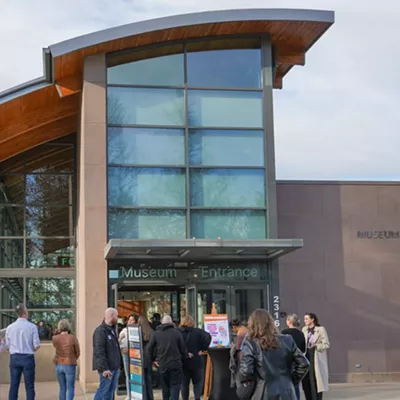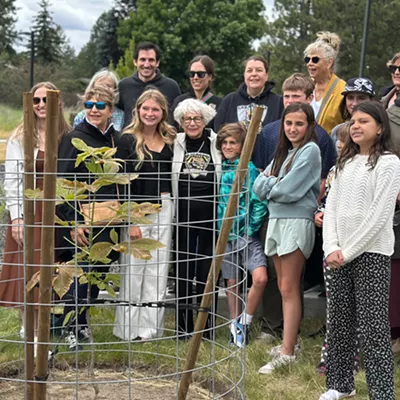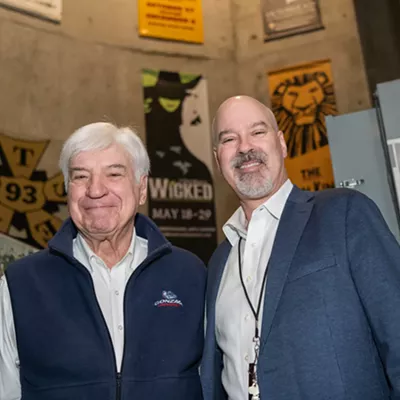While Davenport Hotel owner Walt Worthy wrangles with the Spokane City Council to get a zoning variance to allow him to build a parking structure, neighbors of the grand old hotel still hope Worthy may team up with them to build a larger, multi-use garage that could serve the entire neighborhood.
Advocates of the Davenport Arts District have long said that when the Davenport was revived, the parking garage it would need could also be used by the rest of the businesses in the district. To make that happen, the owners of the block south of the hotel -- Wells and Company, Avista and Worthy -- would need to come to agreements on several fronts. Meanwhile, Worthy's proposal before the city is to build a garage only on his chunk of that block. The small size of the parcel is why Worthy is arguing that he cannot comply with the city's new downtown plan, which frowns on blank walls and calls for street-level retail to be a part of any new parking structure.
While Worthy would not comment on a larger parking project, as he is reviewing his options leading up to Monday night's expected vote on his variance request, his neighbors believe he is open to the concept.
"That block affords a really good opportunity to do something that is really dynamic and exciting," says Ron Wells, who has teamed with Avista to redevelop the Steam Plant just two blocks to the south of the Davenport. "When you think about the Steam Plant and the Holley Mason Building, now all of a sudden you have a lot more activity there. And with the Davenport renovation, that's just an ideal linkage to tie the neighborhood together."
"From the Davenport Arts District perspective, the neighborhood really is coalescing," says Kim Pearman-Gillman, chair of the Davenport Arts District and a vice president for Avista Development, which controls much of the block in question. "There's a lot of need for parking, not only from the Davenport and the Steam Plant, but from all the neighboring properties. It is thought that a collaborative approach will work best."
The various property owners and neighbors have already met twice, and a design charette scheduled for Dec. 11 to look at uses for the site has been postponed until January. Already underway on the northwest corner of that block is another Avista/Wells and Company partnership: the remodeling of the old Rodeway Inn into the Courtyard Office Suites. But if the kinks can be worked out and the rest of the block could be devoted to parking, the additional uses such a facility could feature have those in the neighborhood excited.
Wells says housing units could be incorporated into the garage, and the street-level retail that Worthy cannot accommodate on his limited site could become a part of the project, too. Wells says a small grocery store would be nice to enable more people to live and work downtown. Such a plan would offer plenty of parking for all users at the center of the building while retail, office and housing could wrap the outside. Pearman-Gillman says she'd like to see what she calls the Portland model come into play, with open space for pedestrians similar to Pioneer Square in Portland. Others say it would be an ideal place for an open-air market that could attract crowds to the district.
Meanwhile, the stakes are high for Worthy, as he needs to nail down his Davenport-only garage plan even if it is a fallback position from the neighborhood garage. Those familiar with the project say it's not a case of wanting to begin construction on the garage right away; it's more the reality of showing financiers a coherent plan, which includes parking as a key element. Wells, who supports the zoning changes brought in the downtown plan, believes the city can grant Worthy's variance request without setting a precedent because he was essentially "caught in the door" between the old zoning and the new. And the garage project is not expected to begin construction until June, so there should still be plenty of time to put together an alternative plan.
"It's an opportunity," says Wells of the potential for a bigger parking project on the site, "and sometimes you don't avail yourself of every opportunity. But everyone who has a vested interest is very supportive and wants to be involved in this. The kind of building that could be built on that block -- it could just be really dynamic."
Of course how to pay for such a structure remains to be negotiated, but certainly the property owners and users would need to share the cost, unless one group wanted to run it as a for-profit venture. Another possibility is to create a local improvement district, which essentially is a mini-taxing district that could specifically fund the parking garage.
"Everyone has different needs, and we just need to figure out the common ground," says Pearman-Gillman. "The intent is to come up with agreements that satisfy everybody -- if we do that, you'll see a joint project. I think all the pieces are coming together, and it's going to come out that who wins is Spokane."





















